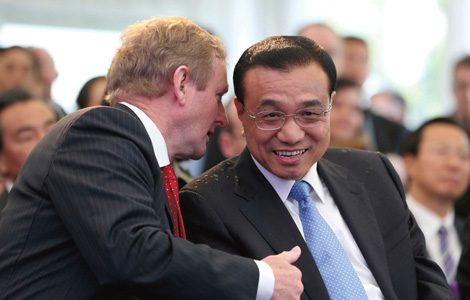Brazil embraces third wave of Chinese investment
Updated: 2015-05-19 09:52
By JI YE in Rio de Janeiro For China Daily(China Daily USA)
|
||||||||
China's investments in Brazil have changed to infrastructure and energy from raw materials and industrial sectors, according to Brazilian daily newspaper O Globo.
"There is a kind of evolution of Chinese investment in Brazil. We have already been in a third wave. It started in the energy sector with China's State Grid, and now there is much interest in railways," the newpaper quoted Guilherme Billi, head of the trade-promotion sector at the Brazilian embassy in Beijing, as saying.
The State Grid Corporation of China has invested more than $1 billion to construct and manage power transmission projects in Brazil. Chinese investors are also very interested in railways and "all the large railways groups in China want to operate in Brazil," added Billi.
In August, China Railway Eryuan Engineering Group Co Ltd qualified to develop a feasibility study for the transoceanic railroad between Sapezal and Porto Velho, linking Brazil to the Pacific Ocean.
Chinese investments in Brazilian railways are regarded as a win-win scenario, benefiting the Chinese companies and helping Brazil transport goods to China. Transportation logistics are a main problem for Brazil when it comes to exports.
"Chinese companies have gone to Brazil to know the laws and rules, but are still waiting for the auctions and bids," said Belli, adding that all of China's major railway companies want to work in Brazil, from supplying trains and manufacturing locomotives to the administration of railways.
China has been Brazil's largest trade partner since 2009, accounting for 18 percent of the country's foreign trade. Despite a slight decrease, bilateral trade last year was $78 billion, according to Brazilian authorities.
Brazil is so interested in Chinese investments that its National Transports Confederation set up an office in Beijing last year, according to O Globo, to highlight business opportunities to Chinese investors and to explain how the Brazilian market works.
"Brazil has a need for almost $1 trillion in investment in infrastructure and urban projects. Chinese companies are interested in and have enough appetite for such opportunities," said Jose Mario Antunes, executive officer of the National Transports Confederation in Beijing.
Antunes and Belli said that although Brazil is going through a political and economic crisis, the turmoil won't endanger trade with China and Chinese investments in the country.
"The Chinese investors know the potential of the Brazilian economy in the long term and will continue their investment from this point of view," said Belli.
Economist Luis Afonso Lima, head of the Brazilian Society for Transnational Companies and Globalization Studies (Sobeet), told O Globo that Chinese investments in Brazil tend to increase in the medium and long terms.
Besides the interest in railways, Chinese companies are active in other parts of Brazil's transportation system. BYD is set to enter the electric bus market, and in Rio the subway and urban train systems are purchasing Chinese products.
Chinese companies are also involved in the oil exploration in Brazil. The consortium which won the right to explore Brazil's largest pre-salt oil camp, Libra, has two Chinese companies — CNOOC and CNPC, along with Total, Shell and Brazil's own state-controlled oil giant Petrobras.

 Premier takes in Irish countryside at old farm
Premier takes in Irish countryside at old farm
 China, Ireland sign agricultural deals
China, Ireland sign agricultural deals
 Monks practice martial art at Quanzhou Shaolin Temple
Monks practice martial art at Quanzhou Shaolin Temple
 The world in photos: May 11-17
The world in photos: May 11-17
 Daredevil breaks blindfolded tightrope walking record
Daredevil breaks blindfolded tightrope walking record
 Helicopter-hailing app sees huge response for ride over Beijing
Helicopter-hailing app sees huge response for ride over Beijing
 Ten photos you don't wanna miss - May 18
Ten photos you don't wanna miss - May 18
 Huge mahjong tiles challenge participants
Huge mahjong tiles challenge participants
Most Viewed
Editor's Picks

|

|

|

|

|

|
Today's Top News
Brazil embraces third wave of Chinese investment
Li arrives in Brasilia to sign agreements
In Brazil's capital, young weigh in on China
Li samples products of an Irish farm
China, US pay more attention to Korean Peninsula
Premier eyes growth points on Brazil trip
9 dead in shootout in Texas
Alibaba denies luxury group's counterfeit claim
US Weekly

|

|






